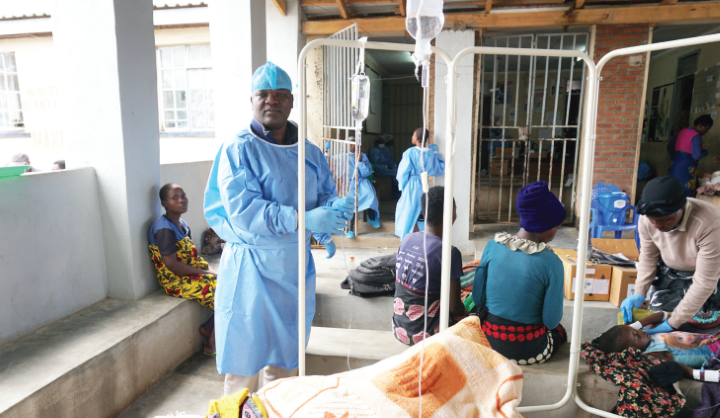The disabled: A forgotten population in Malawi
 The fairly young girl could have passed for a maitre d’ at the small eatery we had stopped at.
The fairly young girl could have passed for a maitre d’ at the small eatery we had stopped at.
In spite of the Chikhwawa heat, the smile she gave to both men and women entering the premises were welcoming. What gave her away were the clothes she was wearing; dirty and tattered, screaming for a wash.
Because she has no shoes on her feet, her legs too showed they have seen and felt the toil of the Chikhwawa heat.
After we concluded business inside, we went outside for some fresh air, that’s when the 16-year-old Enifa opens up.
“Madamu, K10 bwanji?†she begs for some money. “I want to buy a dress, they say Christmas is soon,†she says amidst her naivety in Chichewa.
Then while begging, she asks one of the men to touch her breast if that would make them give her money.
In the ensuing conversation, she reveals that because she is mentally challenged and has a deformed limb, men take advantage of her and she is used to that. Touching her breast wouldn’t be as bad as men using her for sex.
“One of the bicycle taxi men, known as a ma hadi in Chikhwawa, made me pregnant and the doctors felt I had to lose the baby because I wouldn’t be able to look after it,†she claims not feeling remorse for the loss as she agrees with the doctors.
If Enifa had been well educated in family planning, maybe she could have made the choice to either get pregnant or not.
Did she know about family planning?
“No,†she says, adding she was only told when she went to the hospital pregnant.
She explains that despite being disabled and not working, she was the breadwinner for her family.
Her mother was looking up to her to bring money home for going to the maize mill. She, however, wanted to collect money to buy her “Christmas best†at the nearby kaunjika market.
When told she would be given the money without having to sacrifice anything, she beamed with pride.
However, just a stone’s throw away from where we met this girl, is the Chikhwawa District Hospital, a place where Enifa could have gone to access family planning services in order to avoid getting pregnant or even getting infected with the HIV virus.
The World Health Organisation (WHO) while recognising that over 1 billion people or 15 percent of the world’s population have a disability, discovered that this population has a greater unmet need for health care.
“Health promotion and prevention activities seldom target people with disabilities. For example, women with disabilities receive less screening for breast and cervical cancer than women without disabilities. People with intellectual impairments and diabetes are less likely to have their weight checked. Adolescents and adults with disabilities are more likely to be excluded from sex education programmes,†reads a WHO fact sheet on disability and health which further puts Enifa’s story in the limelight.
Enifa’s story is only a tip of the challenges people with disabilities face in different areas of society.
According to Juliana Mwase of Fedoma, when it comes to health information many members of the disabled are disadvantaged because health personnel are not trained to cater for this community.
“The population of persons with disabilities comprise 4.2 percent of the population,†said Mwase speaking through a sign language expert, Betty Wisiki-Kalitera.
Mwase complained that many places where family planning services are offered are not disability friendly or they do not have people that can communicate effectively to the disabled and this population is taken advantage of.
“Information is not provided in disability friendly formats like Braille, sign language and large print. Lack of disability law has also contributed a lot to failure of persons with disabilities to be included in various activities and get necessary support,†she stated.
As a solution to the communication barrier, Mwase called for the endorsement of sign language as one of the national languages.
“There is a need to train more medical personnel and family planning service providers in sign language and Braille,†she added.
But according to the Ministry of Health there is no immediate hope for that.
Ministry of Health communications officer Henry Chimbali accepted that training for health personnel in effective communication for the disabled is a gap that is evident.
“It is a gap that we know and several discussions have been undergoing especially in HIV and Aids,†says Chimbali.
He said that a request to have Braille instructions on condoms so that the blind can understand and use them, must be considered.
“For the condoms, it is an area we have to consider. For any health worker undergoing Braille training, I am not sure if we have any as of now,†he says.
But WHO recommends that issues affecting the health of the disabled be included in national policies and would help in building capacity among health policy-makers and service providers to ensure that people with disabilities are knowledgeable about their own health conditions, and that health-care personnel support and protect the rights and dignity of persons with disabilities.





